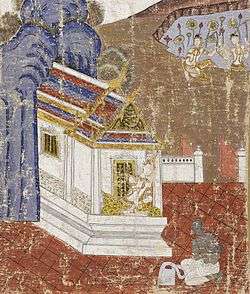ชักแม่น้ำทั้งห้า
Thai
Etymology

ชัก (chák) + แม่น้ำ (mɛ̂ɛ-náam) + ทั้ง (táng) + ห้า (hâa), literally "refer to five rivers".
The term is from Great Birth (มหาชาติ Maha Chat), a Thai epic poem composed around 1482–1483 during the reign of King Trailokkanat. In the poem, the young wife of Beggar Jujaka (ชูชก Chuchok) wants some slaves. Upon hearing about a kind prince, Vessantara (เวสสันดร Wetsandon), the beggar comes to the prince and asks him for his two children. To persuade the prince, the beggar narrates lengthy stories about the five great rivers before comparing the prince's generous mind with the greatness of those rivers. The five rivers are Ganga (คงคา Khongkha), Yamuna (ยมุนา Yamuna), Aciravati (อจิรวดี Achirawadi), Sarabhu (สรภู Soraphu) and Mahi (มหิ Mahi).
Pronunciation
| Orthographic | ชักแม่น้ำทั้งห้า d͡ʑ ạ k æ m ˋ n ˆ å d ạ ˆ ŋ h ˆ ā | |
| Phonemic | ชัก-แม่-น้าม-ทั้ง-ห้า d͡ʑ ạ k – æ m ˋ – n ˆ ā m – d ạ ˆ ŋ – h ˆ ā | |
| Romanization | Paiboon | chák-mɛ̂ɛ-náam-táng-hâa |
| Royal Institute | chak-mae-nam-thang-ha | |
| (standard) IPA(key) | /t͡ɕʰak̚˦˥.mɛː˥˩.naːm˦˥.tʰaŋ˦˥.haː˥˩/ | |
Verb
ชักแม่น้ำทั้งห้า • (chák-mɛ̂ɛ-náam-táng-hâa) (abstract noun การชักแม่น้ำทั้งห้า)
References
- Royal Institute of Thailand. (2007-06-22). ชักแม่น้ำทั้งห้า. Retrieved: 2014-10-17.